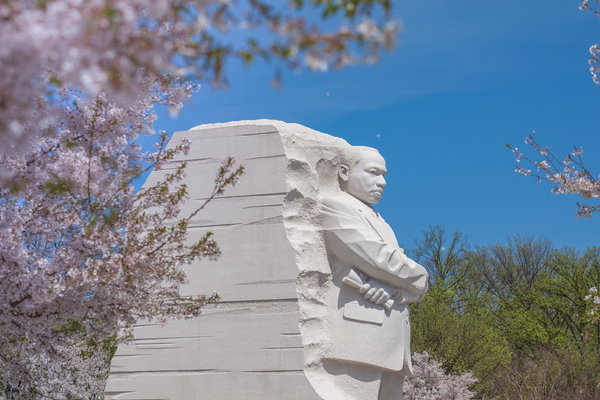“The privileges of being an American belong to those brave enough to fight for them,” declared Gen. Benjamin O. Davis Jr., commander of the Tuskegee Airmen.
Mr. Davis was well acquainted with prejudice and hate. And while his alma mater, West Point Military Academy, later deemed that the general was “destined to lead,” the school was not always so kind to its fourth African American cadet.
“You eat alone. You sleep in your barracks room alone. You ride the bus … alone. No one talks to you,” West Point historian Sherman L. Fleek described Davis’s experience at the school. “No one.”
It was exactly the kind of racism, still pervasive in America decades after we fought a civil war to end slavery, that Martin Luther King Jr., born January 15, 1929, seven years before Gen. Davis graduated from West Point, sought to abolish. He, too, like Davis, experienced racial intolerance and injustice firsthand. And yet he also seemed to believe, against all odds, in the allusive concept of the “privileges of being an American,” stored up for “those brave enough to fight for them.”
And fight he would.
From Birmingham City Jail to the shadow of the Emancipator in the nation’s capital city, King would fight in a style all his own.
“Edmund Burke said on one occasion that when bad men combine, good men must unite,” the Reverend proclaimed at Monmouth College in 1966. “And this is the challenge facing America. When bad men plot, good men must plan. When bad men bomb and burn, good men must build and bind. When bad men shout words of hatred, good men must unite and proclaim the glories of love. When bad men seek to preserve a deadening status quo, good men must unite to bring about the birth of justice.”
This speech is often remembered as King’s “Maladjusted Address.” “Certainly,” he said, “we all want to achieve the well-adjusted life in order to avoid neurotic and schizophrenic personalities. But I must honestly say to you, my friends, that there are some things in our country and some things in the world to which I'm proud to be maladjusted, to which I call upon all people of good will to be maladjusted until the good society is realized.”
It was the basis for his fight. His methods were less extreme than Malcolm X's or the Black Panther Party's. Nevertheless, King refused to modify his message to coddle the culture. He refused “to adjust myself to segregation and discrimination.” He would stick out like a sore thumb if need be until the world around him grasped “the fierce urgency of ‘now!’”
Now! was the time for change. Now! was the time for turning polite society upside down. Now! was the time for extending the privileges of being an American to every citizen of this Union, burgeoning in perfection.
No doubt, King experienced the temptation to become “well-adjusted.” But he warned unequivocally against “the tranquilizing drug of gradualism”; America simply could not afford to wait.
“It would be fatal for the nation to overlook the urgency of the moment,” he cautioned. “This sweltering summer of the Negro's legitimate discontent will not pass until there is an invigorating autumn of freedom and equality.”
Fortunately, that long-awaited, invigorating autumn soon dawned, and it bore the fingerprints of King’s handiwork.
Today, history remembers Martin Luther King as a victor, triumphant in his epoch-changing fight. But that does not mean that the fight, the struggle, the endeavor, to form a more perfect Union is complete. The question is: Do we share King’s determination? Or have we taken the tranquilizing drug of gradualism?
Have we become comfortably well-adjusted in a world gone mad?
The privileges of being an American still belong to those brave enough to fight for them. Do we believe it? More importantly, are we still brave enough to fight for them? The particulars of our fight might have changed, but the object for which we fight has not — a brighter and better future for this beloved country of ours.
“What we call normal's a disaster,” sang singer-songwriter Carolyn Arends in a song based on MLK’s Maladjusted Speech.
“This dysfunction
It needs disruption
So let's all get maladjusted to a world gone mad.”
If you love this country, fight like King
Published in Blog on January 20, 2025 by Jakob Fay






